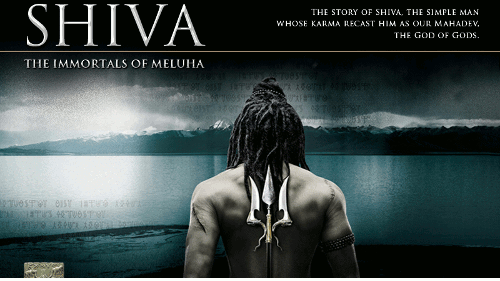Book : The Immortals of Meluha :
Author : Amish Tripathi
The legend of Siva would be fertile ground for authors to adapt from and weave magical tales of adventure from. But only for the talented and hard-working. This book reflects neither talent nor hard work. The fascinating premise remains just that.
What if the legend of Siva, the destroyer of evil, was not a legend, but something that began with an actual human; that acquired the proportions of legend and finally myth over the course of centuries and millenia, because of the astounding feats of that single person?
Unfortunately, this novel is not a fruition of that premise. There are several, several problems with this novel. The simplistic plot, over-simplistic I would call it, for one. It stumbles forward in a linear manner without any surprises or twists that you cannot pick out from a mile away. The narration. The dialog between the characters is evocative of a television soap-opera, at best. Siva is not the yogi in control of his senses; he is some post-adolescent youth in search for adventure.
‘I have seen the bed, dammit!’ grinned Shiva. ‘Now I want to experience it. Get out!’
Yes, some sort of a grotesque cross between a Karan Johar and Ekta Kapoor movie’s dialogues.
Some of the descriptions of Meluhan society (the Suryavanshis, the people inhabiting the Saraswati river basin) are terrifyingly reminiscent more of Soviet-style totalitarian regimes than a caring, humane society. Children are deposited after child-birth at some grand orphanage, called a Gurukul; mothers made to forcibly abandon their children a few weeks after childbirth, and then doled out to wanna-be parents on the basis of a lottery?! Seriously, such hair-brained and frankly inhuman concepts have never been part of Indian society and culture, ever! Why, they have not been part of any society in human history, ever, anywhere, I should think. Yet, this is presented as a stroke of genius that does away with the evils of the caste system.
Without an understanding of the caste system, its utility, or lack thereof, in a society at a given point in time, whatever that may have been, the author takes it upon himself to purge society of this evil with another evil; only this time the replacement is infinitely more evil and inhuman than the system it seeks to replace.
The descriptions of the Indus Valley and Saraswati Harappan civilization dwellings are barely beyond what one would conjure up after spending 15 minutes on Wikipedia. Even here there was so much promise that remains exasperatingly unfulfilled.
Siva is yogeswar. His detachment from the physical world is the complement to the material world signified by Vishnu. Yet Siva in this book comes off as some lost, confused soul, in search of a Bollywood movie plot where he can journey to some exotic country and find himself. Which in itself the anti-thesis of Hindu Vedic philosophy, which states that what is within is also without. You are that. Not here, evidently. The other side of the Suryavanshi Meluhans, the Chandravanshis, and their capital Ayodhya, ends up being drawn with a very simple and very crude palette. It is a crude caricature of a ghetto. The author tries to portray the two societies as opposite sides of the same coin, but fails, pretty much as in every other place of the novel.
I really, really wanted to like this book. I kept persevering; 50 pages, 100 pages, waiting for the plot and pace to pick, the narrative to improve. But it didn’t. To make sure I was doing justice to the author, I did read to the very last page, which ends up with a contrived follow-up to the trilogy. I refuse to bite.
Sorry, this book does not even flatter to deceive. I can only suppose that the success of this book is perhaps more the result of smart marketing than anything substantial. I can only thank myself that the price of reading this book was a couple of hours of time, that I shall however never get back, and twenty-five rupees in rental, that I don’t mind as much.
As a friend remarked, the best and the really good and intelligent part of the book is its cover.
By Abhinav Agarwal
Also Visit Abhinav’s Blog
HHR Review of the book
‘We wouldn’t have found it half as offensive if Shiva was portrayed as an angry Abrahamic God who’s raging around waiting to punish the mortals. Rather what we read is much more depreciating a portrayal with Shiva casually handing out profanities such as ‘bastard’ and other perversions of the modern language in his haughty exclamations of contemporary slang such as– “they’d stop this bullshit”, “to hell with you and tradition”, “bloody stupid rule”, “how would you get me my marijuana? After all that’s the only thing you’re useful for”, etc., quite akin to what we witness today in the rebellious tantrum-throwing teenagers, who like nothing better than to smoke marijuana and shoot off aggressive slang that causes them to forge a sense of pseudo superiority.
Immortals of Meluha is not what you’d expect when it comes to representing the arcane high-culture civilizations of india’s past. Reading the Shiva novels by Amish one rather feels that one is reading about the current world in its current decadent state of affairs. No doubt we have a progressive culture of openness and freedom of expression in india, yet that freedom comes with a responsibility that most modern authors seem to lack in their degenerate expressions of what they call creativity; which today is nothing more than an extension of their own narrow and insular ways of projecting their distorted beliefs and unsophisticated personalities on a deep-rooted civilizational ethos that has spanned the depths of eternity.’
Hindu Human Rights


























